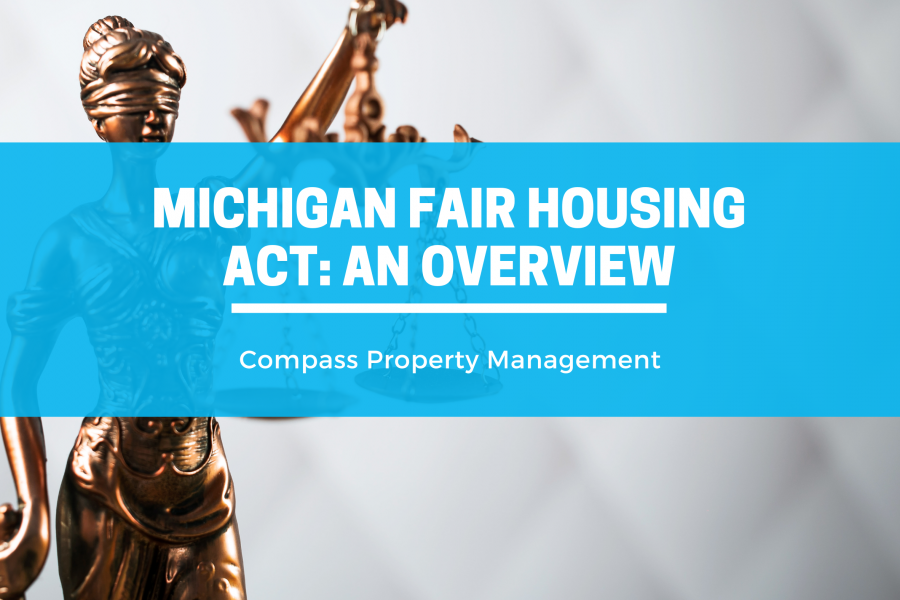
As a landlord in Michigan, you need to treat your residents fairly. Not only is it the right thing to do, and important for maintaining positive landlord-resident relationships, but it’s also necessary to comply with federal and state fair housing laws.
The Fair Housing Act covers all housing providers and requires that they treat their clients fairly and equally when it comes to housing opportunities. It applies in situations such as a home buyer seeking a mortgage, a person seeking housing assistance, and, of course, a resident looking for rental housing.
The following covers this aspect of Michigan landlord-tenant law so you know what you need about the fair housing act when renting out a property in Michigan.
What Is the Federal Fair Housing Act?
The Federal Fair Housing Act prohibits housing discrimination based on seven protected classes: race, color, sex, nationality, familial status, religion, and disability. Various states have also passed laws in addition the Federal Fair Housing Act to add extra protections to cover their residents, including Michigan.
What Are the Protected Classes Under the Michigan Fair Housing Laws?
Fair housing laws in Michigan include all seven of the federal protections and adds age, marital status, sexual orientation, gender identity, gender expression, height, and weight as well.
The Michigan Department of Civil Rights is the state agency that oversees housing discrimination complaints.

Landlords found guilty of housing discrimination may be liable for the following:
- Monetary damages. The specific amount of damages will depend on the particular circumstances of the case.
- Criminal penalties. This is more likely to occur when the landlord discriminates against a resident intentionally.
- Administrative fines. The fines can range from $100 to $10,000.
- Injunctive relief. The court may order you to take certain steps to prevent future discrimination.
What Type of Discrimination Does the Fair Housing Act Forbid?
Under fair housing laws, as a landlord you’ll want to desist from doing the following:
- Discriminating against a resident based on race. For instance, making negative comments about a resident’s race or making assumptions about a resident’s ability to pay or afford rent.
- Discriminating against a resident based on color. For example, refusing to rent to someone because they are Black.
- Discriminating against a resident based on their religion. It’s illegal, for instance, to deny renting to a Muslim woman because she wears a hijab.
- Housing discrimination based on a resident’s national origin. For instance, refusing a prospective resident because they are from another country, have a foreign name, or are associated with a particular nationality. It’d also be discriminative to make negative comments about someone’s culture or language.

- Familiar housing discrimination. An example of housing discrimination based on familial status would be refusing to lease your property to a resident because they have children. Or, charge them a higher rate because you believe that families with children are more likely to cause property damage.
- Housing discrimination based on marital status. For example, not renting your property to a couple because they are choosing to live together but aren't married.
- Discriminating against a resident based on a physical or mental disability. For example, refusing to accept a prospective resident because they are disabled, making discriminatory statements about their disability, or failing to provide the resident with their request for a reasonable accommodation.
Are There Any Exemptions to the Fair Housing Act?
Yes, a few exemptions do exist to the Fair Housing Act. They are as follows.
- Owner-occupied buildings. Where an owner lives in one of the units in an owner-occupied building. The building must have a maximum of four units.
- Single-family home rented out by the owner without the use of brokerage services. The owner must not own more than three single-family homes at one time.
- Housing operated by a private club or religious organization. These types of housing are exempted from fair housing rules as long as they are not offered for sale or rent to members of the general public.
- Housing meant for people aged over 55 years. The housing must, however, meet specific requirements to qualify for the exemption.

How Can Landlords Avoid Fair Housing Discrimination Complaints?
As a landlord, Michigan fair housing law requires you to abide by certain rules to avoid discriminating against residents. It’s important to make sure you do the following:
- Treat all prospective residents equally and fairly regardless of their race, color, national origin, religion, or any other protected class.
- Use a standardized rental application for all prospective residents.
- Screen all residents fairly and use the same screening process for every applicant.
- Have clear policies. For instance, you’ll want residents to know the timeframe you have for responding to maintenance requests. Otherwise, a resident may feel discriminated against if another case is handled more quickly than theirs.
- Follow standardized and legal procedures when allowing a resident to break their lease early.
- Always be respectful and professional when you interact with your renters.
Michigan Fair Housing Laws: Bottom Line
Now you’re familiar with the Michigan Fair Housing laws. If you have a question or need expert help in managing your rental property, contact Compass Property Managementtoday. We provide property owners in the Grand Rapids area with professional full-service property management services. Get in touch to learn more!
Disclaimer: Please note that the information provided in this blog is intended for general guidance and should not be considered as a replacement for professional legal advice. It is important to be aware that laws pertaining to property management may change, rendering this information outdated by the time you read it.
